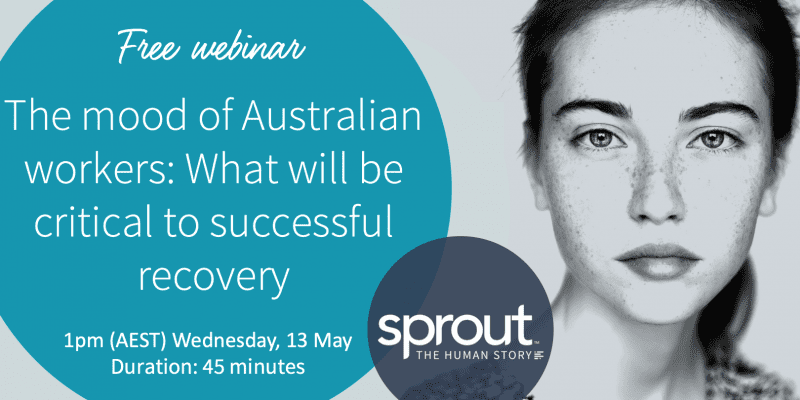In the wake of the changes wrought by the COVID crisis and social distancing measures such as working from home, maintaining positive employee experience is more important than ever. A recent survey from Sprout Strategy highlights what Australian employees are feeling and what CX leaders need to do to maintain a positive employee experience.
Considerable attention has been given to the impact of the crisis on the brands reputation and what this means for customers. But customers are also employees. Most CX leaders and professionals understand the link between the performance and motivations of our people and the experience of our customers.
A major focus for Sprout’s annual “Mood of Australia” research for this year was to examine what workers were feeling ‘right now’ in response to the crisis and how they felt about the actions being taken by their employers. Rebecca Wilson, Director of Human Experience at Sprout Strategy, comments, “The significant impact of the COVID-19 outbreak on employees’ personal and work lives is leading to employee anxiety, frustration and burnout. How organisations support their employees through these challenging days will impact how successfully they will recover”.
Each state of Australia has started to implement plans to remove lockdown restrictions and hopefully return to business as usual. But things are unlikely to go back to being normal soon. Wilson advises, “How your organisation is perceived as handling this crisis will have impact for years to come. The survey found that those workers whose job has been affected by pandemic related lockdowns are far less likely to recommend their employer as a place to work”.

The survey found:
- Just over a third of workers disagree with the statement that “My company will put my health and wellbeing first in making decisions about the risk of coronavirus”
- Less than 60% of Australian workers believe that their company has the technology resources to allow people to work from home
“They are also significantly less likely to believe that their employer has put their health and well-being first when making COVID-19 related business decisions. This might seem to make sense, but what are the long-term implications for this?”
Why you should care
Employees can greatly affect the emotional mood of a customer. Customers buy a product or service because it makes them feel good at the time. If something happens that disrupts that feeling, such as a frontline agent being rude or unhelpful, they will become dissatisfied.
If your employees are anxious, afraid or stressed out this will impact the interactions they have with customers. The motivation and productivity of your teams will slow down.
There are some organisations, however, who have made employee experience a top priority. Wilson observes, “There is evidence that companies are prioritising employee experience. Disney for example are radically re-thinking their leadership development program and now focussing on empathy, resilience, caring and safety. Other organisations have been reported as stopping all performance and goal programs for the year to reduce anxiety levels for their people”.
Understanding the employee journey
The key to addressing all of this is adequate understanding of the true state of mind of your employees. This is not going to be achieved by just asking them how satisfied they are with the company’s response but with a deeper insight as to what their motivations are for work and what emotions we should be tapping into as leaders. “Just as with customer experience where we map the customer journey, its useful to map the employee journey and the employee pandemic experience”, says Wilson.
“Understanding this will mean that you can make decisions based on what employees are needing from you right now rather than on assumptions and hunches”.
Companies that understand what their employees are feeling and why and can engage their employees will gain numerous benefits in terms of improved productivity, reduced staff turnover costs and less absenteeism. But the biggest benefit is the impact it has on customers. Companies that invest in their culture and the employee experience benefit through enhanced customer experience which in turn offers a significant point of differentiation for the brand.

